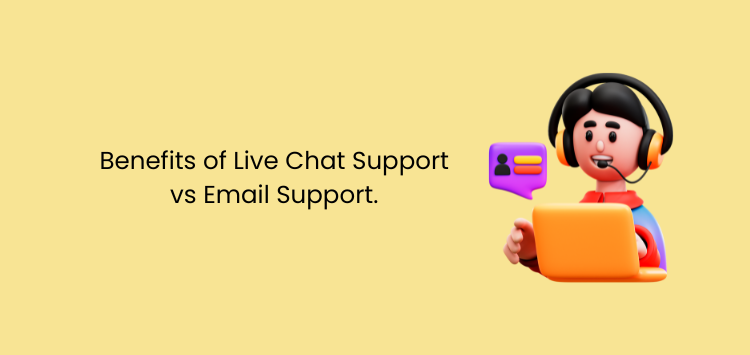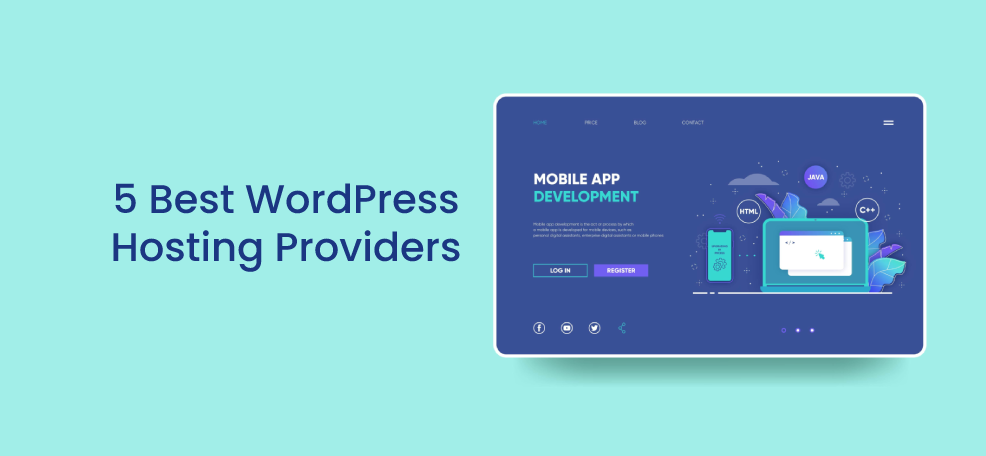When it comes to online customer support, two prominent methods stand out: live chat and email. These two communication channels have revolutionized how businesses connect with customers, offering distinct advantages and capabilities. In this article, we will dive into the world of customer support and compare and contrast the benefits of live chat support and email support.

What’s Live Chat Support?
Live chat support is a customer service and communication channel that enables real-time, text-based interactions between businesses or organizations and their customers. It typically occurs through a chat interface on a website or within a mobile application. Live chat support allows customers to seek assistance, ask questions, or resolve issues by typing messages to a live chat agent or representative.
Consider exploring live chat support tools like Chatway and Chaty for unparalleled customer interaction.

Advantages of Live Chat Support
Live chat support offers numerous advantages for both businesses and customers. Here are some of the key benefits:
- Real-Time Assistance: Live chat provides immediate, real-time support, allowing customers to get help instantly, which is often impossible with other support channels like email.
- Increased Customer Satisfaction: The quick and personalized nature of live chat interactions tends to lead to higher customer satisfaction as issues are resolved promptly, and customers feel heard.
- Cost-Effective: Live chat is often more cost-effective than phone support, as agents can handle multiple chats simultaneously, reducing the need for a large support team.
- Convenience: Customers can access live chat support without picking up the phone or sending an email. This convenience aligns with modern consumers’ preferences for quick and efficient service.
- Multitasking: Live chat allows customers to multitask while seeking assistance. They can continue with other tasks or browse the website during the chat, enhancing their overall experience.
- Reduced Response Time: Live chat typically has shorter response times than email, where customers may have to wait hours or even days for a reply.
- Personalization: Agents can use customer data to personalize interactions, addressing customers by name and referring to past interactions, creating a more personalized experience.
- Lower Cart Abandonment (E-commerce): In e-commerce, live chat can help answer customer questions during the buying process, reducing cart abandonment rates and increasing conversions.
- Enhanced Problem Solving: Live chat enables support agents to ask clarifying questions and provide step-by-step guidance, making diagnosing and solving complex issues easier.
- Detailed Records: Live chat interactions are typically logged, creating detailed records that can be useful for future reference, analysis, and improving customer service.
- Global Reach: Live chat transcends geographic boundaries, allowing businesses to support a global customer base, regardless of time zones.
- Analytics and Insights: Live chat platforms often offer analytics tools to track Key metrics, including customer behavior, and agent performance, which can inform strategic decisions.
- Scalability: Live chat support can be scaled up or down according to the demand, making it adaptable to changing business needs.
- Proactive Engagement: Businesses can use proactive chat invitations to engage website visitors, offering assistance before customers initiate a chat, potentially increasing sales and customer satisfaction.
- Accessibility: Live chat is accessible on various mobile phones and tablets, making it a versatile and mobile-friendly customer support option.
- Competitive Advantage: Offering live chat support can set a business apart from competitors that rely solely on traditional support methods.
What’s Email Support?
Email support involves using electronic mail (email) to communicate between businesses or organizations and their customers or clients. It’s a widely adopted method for customer support due to its convenience and accessibility. In email support, customers send their queries, concerns, or issues via email to a dedicated support email address provided by the business.
One of the defining characteristics of email support is its asynchronous nature. Unlike live chat or phone support, where interactions happen in real time, email support allows for non-instantaneous communication. Customers can send emails at their convenience, and support agents respond when they can address them. This asynchronous approach is advantageous because it doesn’t require both parties to be available simultaneously, making it suitable for situations where real-time interaction is optional.

Benefits of Email Support
Email support offers several advantages for businesses and customers alike. Here are the key benefits:
- Asynchronous Communication: Email support allows customers to send inquiries or issues at their convenience, and support agents can respond when they have the time to provide thoughtful and detailed responses. This flexibility benefits customers in different time zones or those with busy schedules.
- Detailed and Well-Considered Responses: Email support enables support agents to take the time to research and compose well-thought-out responses. This can lead to more comprehensive solutions to customer inquiries and issues.
- Written Record: Every email interaction creates a written record of the conversation, which serves as a valuable reference for customers and businesses. It helps ensure accuracy, accountability, and transparency in customer interactions.
- Documentation for Complex Issues: In cases where issues are complex and require multiple steps to resolve, email support excels. The email thread allows for step-by-step documentation of the process, making it easier to track progress and refer back to previous communications.
- Accessibility: Email is accessible to many customers, regardless of location or device use. This inclusivity makes it a practical choice for businesses with a diverse customer base.
- Efficient Handling of High Volume: Email support is well-suited for businesses dealing with high customer inquiries. Support agents can manage multiple email threads simultaneously, ensuring a timely response to many customers.
- Customer Convenience: Customers appreciate the convenience of email support. They can send their inquiries or issues without waiting in phone queues, providing a more relaxed and customer-centric experience.
- Global Reach: Email transcends geographical boundaries, enabling businesses to offer support to a global customer base. It is particularly beneficial for international businesses or those targeting a diverse audience.
- Record for Quality Assurance: Businesses can review email interactions for quality assurance, training purposes, and continuous improvement of their customer support processes.
- Legal and Compliance Needs: In some industries, maintaining detailed records of customer interactions is a legal requirement for compliance purposes. Email support ensures these records are readily available for auditing and regulatory compliance.
- Customer Control: Email support gives customers control over their communication. They can refer back to previous emails, ensuring they have a record of the support they’ve received.
- Enhanced Privacy: Some customers may prefer discussing sensitive issues or personal information through email, as it provides a level of privacy that other support channels may not offer.
Overall, email support offers a flexible and cost-effective way for businesses to engage with their customers, ensuring that inquiries and issues are addressed efficiently and accurately. It also provides a written record of interactions, which can benefit customers and businesses in various ways.
Comparing Live Chat Support and Email Support
When it comes to customer support, businesses have two primary options to choose from: live chat support and email support.
Both have advantages and limitations, so let’s explore the key points and see how they stack against each other.
1. Response time: With live chat support, customers can get instant responses to their queries, allowing for real-time interaction. No more waiting for days or even hours for an email response. On the other hand, email support might take longer as it depends on the availability of customer service representatives. So, live chat is the way to go if you’re looking for quick resolutions.
2. Personalization: Live chat support allows for a more personal touch. Customers can chat with support agents in real time, building a rapport and addressing their concerns more efficiently. Email support, on the other hand, can sometimes seem more robotic and less human, lacking that personal touch and empathy. So, if you value a personalized customer experience, live chat is your best bet.
3. Multitasking: Live chat support enables customers and support agents to multitask. Customers can continue browsing your website or performing other tasks while chatting without being tied to a lengthy email exchange. Similarly, support agents can handle multiple chats at the same time, increasing efficiency and reducing wait times. With email support, however, the back-and-forth can be slow and tedious, making multitasking challenging for both parties.
4. Clarity of communication: In terms of clarity, live chat support has the upper hand. It allows for immediate clarification of any doubts or queries in real time, reducing the chances of misunderstandings. Email support, on the other hand, can sometimes lead to misinterpretations due to delayed responses and lack of immediate interaction. So, if clear and concise communication is key, live chat support is the winner.
As we compare live chat support and email support on these key points, it becomes evident that live chat support takes the lead in response time, personalization, multitasking, and clarity of communication. However, it’s important to consider the nature of your business and the specific needs of your customers before making a choice. Remember, happy and satisfied customers are the cornerstone of any successful business. So, choose your support channel wisely and provide the best experience possible.
Conclusion
Live Chat Support shines with real-time interaction, boosting customer satisfaction, lightning-fast problem resolution, and skyrocketing sales. On the other hand, Email Support is able to handle more complex queries, provide detailed information, and keep a written record of communication. But which is the best option? It all boils down to your specific business needs. Do you value speed and immediate solutions? Live Chat Support is your go-to. Or do you prefer a more systematic approach with a focus on thoroughness? Email Support saves the day. Each option has strengths, and the choice ultimately depends on what suits your business best. Consider your requirements, weigh the pros and cons, and make an informed decision. Remember your customers are counting on you!









